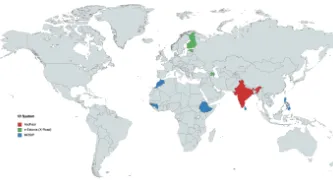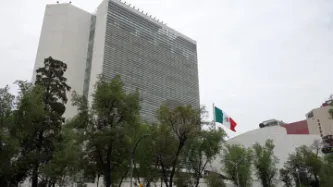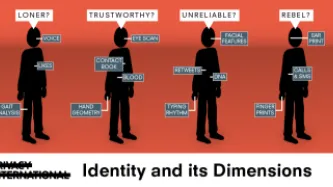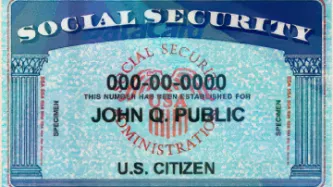Search
Content type: Video
In Kenya, if you don’t have an ID, life can be extremely difficult. But for thousands of people across the country, getting an ID can be nigh on impossible. Some Kenyan citizens can’t obtain a national ID because they are registered in the Kenyan refugee database. Often referred to as victims of double registration, their predicaments reveal a deeper problem with ID itself.Now Haki na Sheria - a Kenyan organisation advocating for and supporting the victims of double registration - and three…
Content type: Long Read
Governments around the world are increasingly making registration in national digital ID systems mandatory for populations, justifying its need on a range of issues from facilitating access to services, to national security and fighting against corruption. This is an attempt to create a "foundational identity" for an individual, or "a single source of truth" about who someone is, according to a government agency. These identity systems are run by governments, sometimes by private companies, or…
Content type: Advocacy
Some of the most vulnerable groups in Mexico are amongst the groups at risk from a draft General Population Law that creates a biometric “Unique Digital Identity Card” (CUID), argue civil society organisations. The proposed law has now reached the senate, and has raised serious concerns from civil society organisations. Led by our global partner in Mexico Red en Defensa de los Derechos Digitales (R3D), PI along with 25 organisations have signed a joint letter to the members of the senate,…
Content type: News & Analysis
After almost 20 years of presence of the Allied Forces in Afghanistan, the United States and the Taliban signed an agreement in February 2020 on the withdrawal of international forces from Afghanistan by May 2021. A few weeks before the final US troops were due to leave Afghanistan, the Taliban had already taken control of various main cities. They took over the capital, Kabul, on 15 August 2021, and on the same day the President of Afghanistan left the country.As seen before with regime…
Content type: Advocacy
On 6 August 2021, the World Health Organisation (WHO) published its technical specifications and implementation guidance for “Digital Documentation of COVID-19 Certificates: Vaccination Status” (DDCC:VS) following months of consultations. As governments around the world are deploying their own Covid-19 certificates, guidance from the global health agency was expected to set a global approach, and one that prioritises public health. As such, we would expect the WHO to identify what these…
Content type: News & Analysis
This article was written by Abdías Zambrano, Public Policy Coordinator at IPANDETEC, and is adapted from a blog entry that originally appeared here.
Digital identity can be described as our digital personal data footprint, ranging from banking information and statistics to images, news we appear in and social network profiles, interactions with and in digital platforms, and information contained in private and public repositories. Our whole life is online, often leaving us with little choice…
Content type: Long Read
This report is available in English.
La mayoría de los documentos nacionales de identidad y demás documentos emitidos por autoridades estatales incluyen un marcador de género. Estos marcadores suelen recibir el nombre de “marcador de sexo” aunque este término no sea preciso. La presencia de dichos marcadores, especialmente en los certificados de nacimiento, promueve el énfasis de nuestra sociedad en el género como criterio de asignación de identidades, roles y responsabilidades sociales. Al…
Content type: Long Read
Este informe está disponible en español.
Most national ID or identifying documents include a gender marker. This is often known as a 'sex marker,' even though the term is inaccurate. The presence of such markers, especially on birth certificates, contribute to our society’s emphasis on gender as a criterion for assigning identities, roles and responsibilities within society. With gender being such a determining and dominant identifier, it puts it at the centre of so many arrays of our…
Content type: Case Study
The exclusion caused by ID can have a devastating effect on people, limiting their opportunities and ability to survive.
Names have been changed.
Carolina is in a more privileged position than many other migrants, she admits that. She has a formal job, for one. She is – and has always been – in Chile legally: her previous visa has expired, and her new one is being processed. Under the law, she is permitted to stay and work in the country while this is happening. But she is finding the…
Content type: Case Study
Photo credit: Douglas Fernandes
The exclusion caused by ID can have a devastating effect on people, limiting their opportunities and ability to survive. In September 2018, Privacy International interviewed people in Santiago, Chile who had faced problems from the Chilean ID system, known as the RUT. Names have been changed.
It was never going to be easy for Liliana, entering Chile without a visa. But, in Chile, the ID system – known as the RUT – is ubiquitous; without one, as she would…
Content type: Long Read
Photo credit: Francisco Javier Argel
Questions of identification and ID, with their associated privacy risks, are only increasing. There are multiple dimensions to understanding the impact of ID and identification; a key one is to understand how it can exclude. This is why Privacy International is conducting research to explore this important and underreported aspect.
Read our case studies: Carolina and Iliana.
In the identity discourse, identity is often closely linked to themes of “…
Content type: News & Analysis
Photo Credit: Marion S. Trikosko
This month, the World Bank's Identity for Development (ID4D) initiative is launching its inaugural "Mission Billion Challenge", a competition designed to promote innovation in the identity space with the inaugural question: "How can digital identification systems in developing countries be designed to protect people’s privacy and provide them with greater control over their personal data?” But make no mistake: introducing "privacy by design" does…
Content type: Long Read
Photo Credit: Max Pixel
The fintech sector, with its data-intensive approach to financial services, faces a looming problem. Scandals such as Cambridge Analytica have brought public awareness about abuses involving the use of personal data from Facebook and other sources. Many of these are the same data sets that the fintech sector uses. With the growth of the fintech industry, and its increase in power and influence, it becomes essential to interrogate this use of data by the…
Content type: Long Read
Image attribution: By Legaleagle86 at en.wikipedia, CC BY-SA 3.0.
In a long-anticipated judgment, the Indian Supreme Court has ruled that India's controversial identification system Aadhaar is Constitutional. They based their conclusion on notes that there are sufficient measures in place to protect data, and that it is difficult to undertake surveillance of citizens on the basis of Aadhaar.
But there is some good in this ruling. The court has demanded that the Government introduce…
Content type: Examples
In December 2017, it was revealed that the large telco Bharti Airtel made use of Aadhaar-linked eKYC (electronic Know Your Customer) to open bank accounts for their customers without their knowledge or consent. eKYC is a way of using data in the UIDAI database as part of the verification process, which Airtel made use of for the issuing of SIM cards, and also secretly opened bank accounts with their Airtel Payments Bank. More than 2 million accounts could have been opened, receiving more than…
Content type: Long Read
Who are you? The Challenges of Identity and Identification
“Identity” is a word that covers an incredible range of contested, deeply personal and highly politicised questions. These range from the political and the sociological, through to the psychological and philosophical. A question such as “who are you?” can elicit a multiplicity of responses, none of which are straightforward, are sometimes highly contextual, and are often deeply contested.
However, there is something of an attempt to…
Content type: Long Read
The Sustainable Development Goals (SDGs) are the United Nations-led initiative to define the development agenda. Building on the eight Millennium Development Goals, the SDG’s 17 goals – and the 169 targets – serve as an opportunity to tackle many of the most pressing issues in the world today. The SDGs are also explicitly grounded in human rights. Goal 16 on “peace, justice, and sustainable institutions” aims to “Promote peaceful and inclusive societies for sustainable development, provide…
Content type: Examples
In February 2018 the Home Office gave the Yorkshire Police 250 scanners that use a smartphone app to run mobile fingerprint checks against the UK's criminal fingerprint and biometrics database (IDENT1) and the Immigration and Asylum Biometrics System (IABS). The app was simultaneously made available to all 5,500 frontline Yorkshire Police officers, with a plan to roll the service out to another 20 forces by the end of 2018. Police are able to use the scanners when people they stop on the street…
Content type: Examples
In 2012, London Royal Free, Barnet, and Chase Farm hospitals agreed to provide Google's DeepMind subsidiary with access to an estimated 1.6 million NHS patient records, including full names and medical histories. The company claimed the information, which would remain encrypted so that employees could not identify individual patients, would be used to develop a system for flagging patients at risk of acute kidney injuries, a major reason why people need emergency care. Privacy campaigners…
Content type: Impact Case Study
What happenedSince the late 1980s governments across the world have been trying to build identity registries. By the early 1990s, there were similar policies being pursued by a number of governments across the Pacific region, with similar technologies from the same companies. In the mid-90s ID cards became a ‘modern’ policy, implementing smart cards. By 9/11 biometric IDs became the preferred solution to undefinable problems. Then came vast databases of biometrics to identify people — with…
Content type: Long Read
Image: Eric Jones
The UK government last week hosted hundreds of surveillance companies as it continues to try and identify “technology-based solutions” able to reconcile the need for controls at the Irish border with the need to avoid them.
The annual showcase conference of 'Security and Policing' brings together some of the most advanced security equipment with government agencies from around the world. It is off limits to the public and media.
This year’s event came as EU and UK…
Content type: Long Read
To celebrate International Data Privacy Day (28 January), PI and its International Network have shared a full week of stories and research, exploring how countries are addressing data governance in light of innovations in technology and policy, and implications for the security and privacy of individuals.
According to the World Bank, identity “provides a foundation for other rights and gives a voice to the voiceless”. The UN Deputy Secretary-General has called it a tool for “advancing…





















